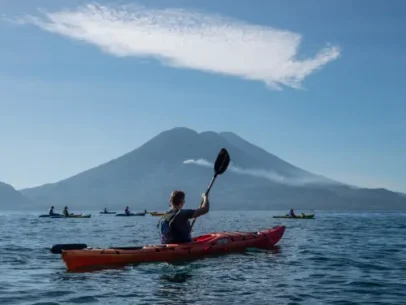
The Bird’s Word Blog
Plan a Sustainable Adventure in the Azores

Are you looking to pin the Azores on your travel map? I was – and I did! Nestled in the heart of the Atlantic Ocean, this group of nine volcanic islands is turning heads not just for their stunning landscapes and marine wonders but also for their impressive commitment to environmental preservation and sustainable tourism.
 I recently experienced these eco-friendly islands firsthand on our Azores Archipelago Revealed adventure at Journeys International. Previously having lived in Hawaii for three years and now having explored the Azores for myself, I wouldn’t characterize this group of islands, as some have, as the “Hawaiian Islands of the Atlantic.” Instead, I think the Azores are incredible in their own right as a beautiful archipelago with unique culture and natural wonders. Explorers should seek out these islands for the active and interactive activities that will introduce them to a culture committed to helping Mama Earth thrive.
I recently experienced these eco-friendly islands firsthand on our Azores Archipelago Revealed adventure at Journeys International. Previously having lived in Hawaii for three years and now having explored the Azores for myself, I wouldn’t characterize this group of islands, as some have, as the “Hawaiian Islands of the Atlantic.” Instead, I think the Azores are incredible in their own right as a beautiful archipelago with unique culture and natural wonders. Explorers should seek out these islands for the active and interactive activities that will introduce them to a culture committed to helping Mama Earth thrive.
While hiking, biking, and eating through the islands, I was keen to learn about how Azoreans integrate sustainability into their tourism culture. As a mindful traveler hoping to help other mindful travelers, I’m eager to share what I learned about the eco-friendly practices locals have implemented to keep their ecosystems healthy and thriving. Let’s dive in.
A Green Blueprint
The Azores are a shining example of sustainable thinking. Thanks to their remote location about 1,500 kilometers from the coast of Portugal, the islands have always had to be self-reliant. This necessity has fostered a culture of sustainability that is woven into the fabric of their resource management strategies.
Renewable energy is big here. The islands aim to be carbon-neutral by 2050, and they’re well on their way to achieving this goal through harnessing geothermal, wind, and hydroelectric power. When you visit, you’ll notice that much of their energy comes from these clean and green sources. It’s this kind of forward-thinking that earned the Azores the praise of being the first archipelago in the world recognized by EarthCheck (a leading scientific benchmarking certification and advisory group for global travel and tourism) as a Sustainable Destination.
 Exploring the Azores with Care
Exploring the Azores with Care
When it comes to tourism, sustainability is always at the forefront of adventure design. Ecotourism isn’t just a buzzword here; it’s a practice woven into the everyday. Each activity is designed with the earth in mind, from thoughtful hiking through untouched landscapes to sustainable whale watching tours. There are mutually enforced agreements in place to keep hiking trails lush, prioritize marine life protection, and keep the islands a pleasant place for the locals to live.
Take the whale watching industry, for example. The Azores are one of the best places in the world to see these majestic creatures in their natural habitat. At certain times of the year, you could see Orcas, Blue whales, Humpback whales, Sperm whales, and many other Cetaceans enjoying the surrounding waters. Local operators are committed to responsible practices that ensure minimal impact on the whales and their environment, such as small group sizes, maintaining distance from animals, and minimizing noise near animals, among other guidelines. Tour operators also hire marine biologists to give educational briefings that teach visitors about animal behavior, the importance of conservation, and how to behave on the boats when they encounter these spectacular yet susceptible animals.
Local Flavors, Global Impact… and Wine!
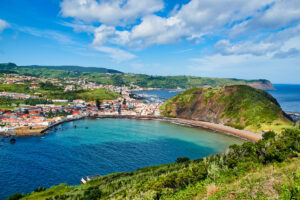
Sustainability in the Azores isn’t limited to energy and ecotourism. It extends to the dining table as well! The islands boast a farm-to-table scene that’s hard to beat. A lot of what I consumed here was grown or caught locally. The volcanic soil and rich ocean make for some incredible flavors in fresh seafood dishes, unique cheeses, and delicious wines.
The archipelago’s volcanic soil imparts a distinct mineral quality to the grapes grown there. The islands are particularly famous for their white wines, made predominantly from the indigenous Verdelho grape, which thrives in the breezy and humid climate. Pico Island, recognized by UNESCO for its remarkable wine landscape, is at the heart of the wine culture. The vineyards are nestled between black volcanic rocks, creating a striking contrast against the deep blue of the Atlantic. Wineries in the Azores embrace sustainable practices, including using organic cultivation methods and relying on the unique ecosystem to maintain vine health, reducing the need for chemical interventions. A visit to the Azores isn’t complete without touring these picturesque vineyards, meeting the passionate winemakers, and, of course, sampling the locally-made wines.
Visiting local restaurants and vineyards not only satisfies your taste buds but also supports local farmers and fishermen. This reduces the carbon footprint associated with transporting food items from abroad and helps maintain the economic sustainability of the islands’ communities.
Generally, I am not much of a wine drinker because I am susceptible to headaches. However, on this trip, I couldn’t shy away from trying the local varietals while traveling. I carefully sampled a glass of Pico wine and was pleasantly surprised to still be headache-free at the end of the day. I discovered that the sustainable wine-making processes used in the Azores reduced impurities and produced high-quality wines that even I could enjoy.
Community and Culture
The local community is deeply involved in sustainability efforts. Many Azoreans are descendants of generations of islanders who’ve lived in harmony with nature, and they bring this respect for the environment into every aspect of modern life and business.
When you visit, you’ll feel this community spirit everywhere—at local festivals filled with traditional music and dance, at artisan markets featuring locally made crafts, and in your locally owned, managed, and decorated accommodations. Engaging with the community gives you a deeper appreciation of the Azores not just as a travel destination, but as a place where people live, work, and care for their environment.
The Call of the Azores
Every aspect of your visit to the Azores, from the moment you land to your last day on the islands, offers a chance to participate in and learn about sustainability. This isn’t just about having a great vacation—it’s about experiencing and contributing to a place that truly embodies the principles of sustainable living.
If you’re itching for a European getaway that satisfies your wanderlust without compromising environmental ethics, the Azores should be at the top of your list!
If you’re interested in planning an adventure, I’d love to share more of my Azores experience. Please get in touch with me to chat and start planning your own memorable and sustainable trip to the Azores.
Related Adventures
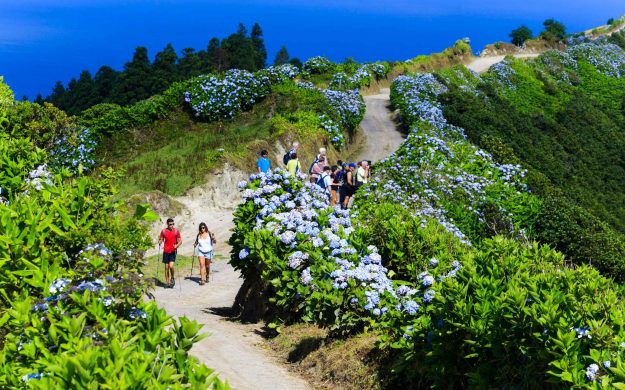
Azores Archipelago Revealed
Shhhh...don't tell anybody. We've discovered a hidden and rarely visited archipelago, one that most people overlook in their search for a refreshing and sensational outdoor adventure. It's the Azores, nine islands about 800 miles off the coast of Portugal, and we think it may just be the best-kept secret in the entire Atlantic Ocean. And with hiking volcanoes, swimming in natural thermal pools, whale watching and more, this adventure is the best, all-encompassing way to experience it.
From $3850 Per Person
Active
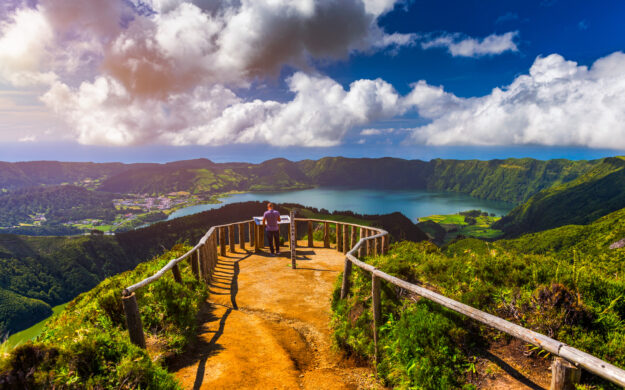
Biology, Conservation & Culture in the Azores
Discover São Miguel Island, Pico Island, and the surrounding marine ecosystems on a rare exploration of conservation, sustainability, and culture in the Azores archipelago.
From $8950 Per Person
Vigorous
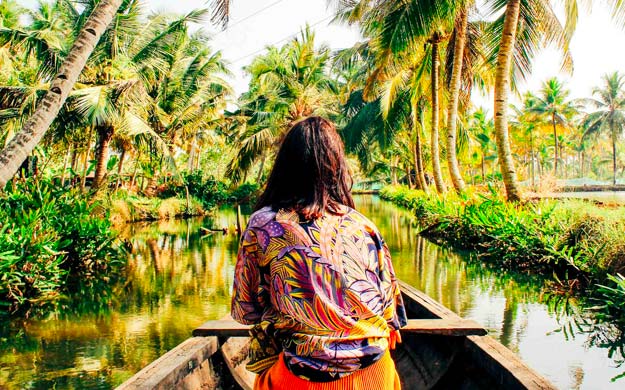
Design an adventure with Journeys International!
With over 40 years of experience, we create experiences that match your goals.
Start Planning

